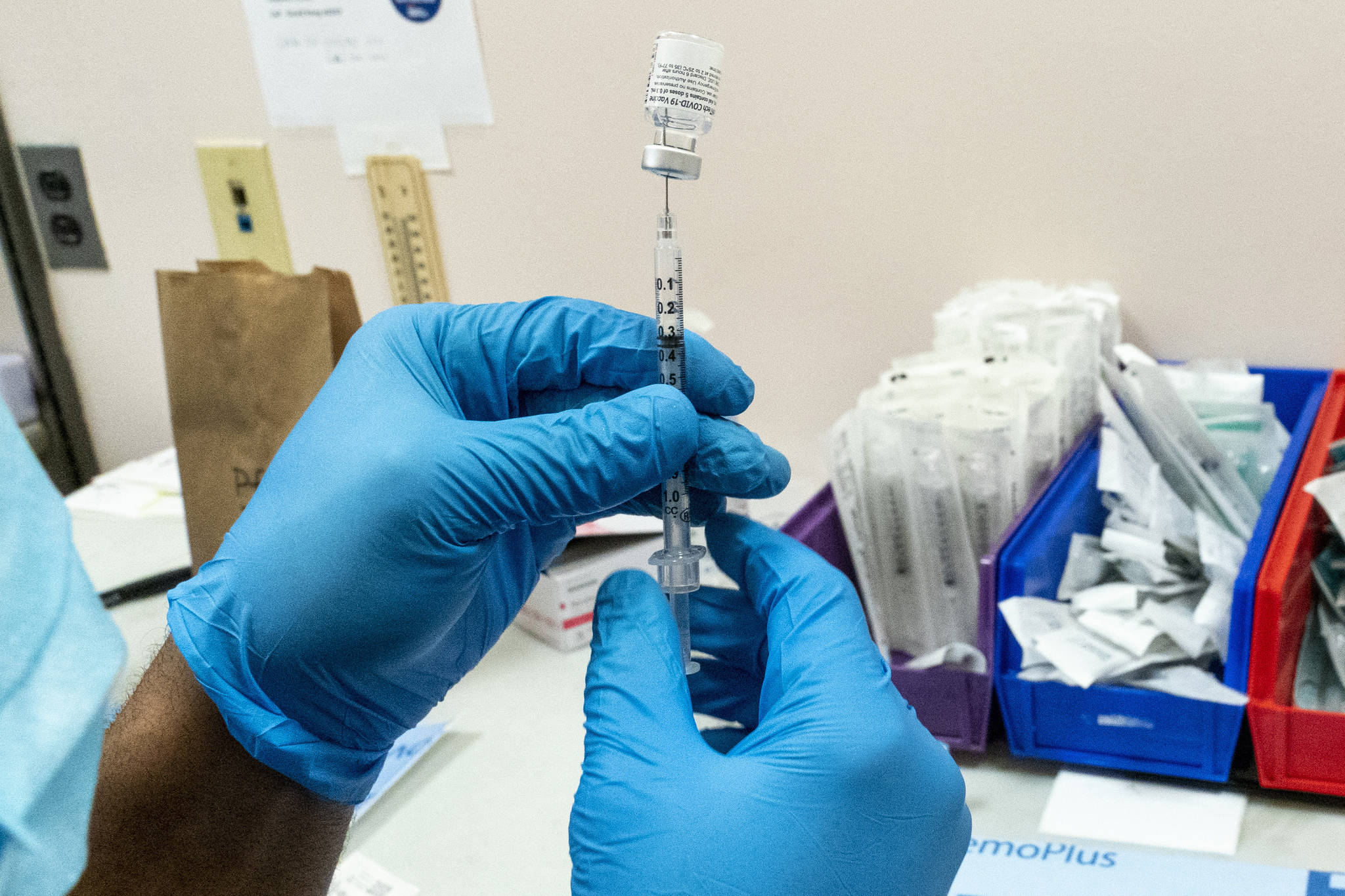More than 100,000 doses of COVID-19 vaccine are expected to soon arrive in Alaska.
The state announced 60,760 state-allocated vaccine doses, 32,720 doses allocated to the federal Indian Health Service and 9,640 supplemental doses are anticipated to arrive in the state in March. The supplemental vaccine doses include 6,070 state-allocated doses and 3,570 IHS doses.
“Those are all first doses with second doses coming behind it,” said Dr. Anne Zink, Alaska’s chief medical officer, during a Wednesday news conference.
That means the doses expected to arrive in the state potentially represent 103,120 newly vaccinated Alaskans.
“We’re super-excited to have this out and to see so much more vaccine,” Zink said.
Of the expected doses, 53,820 are the Pfizer-BioNTech vaccine and 49,300 are the Moderna vaccine, according to the Department of Health and Social Services. The total does not include vaccine allocated to the Department of Defense, Department of Veterans Affairs or the Federal Retail Pharmacy Program.
[Vaccine clinic registration opens early for seniors]
Zink and state epidemiologist Dr. Joe McLaughlin said while health officials are still working to understand how effective the vaccines are against variant strains of the coronavirus. A case involving a variant of the virus originally traced to Brazil has been confirmed in the state, health officials said, and so have two cases involving a variant originally traced to the United Kingdom.
McLaughlin said there’s some evidence that the strain of the virus originally traced to Brazil may affect the ability for antibodies —either from vaccination or prior infection —to “recognize and neutralize the virus.”
“The extent to which that may be occurring is unclear,” he said.
Zink said studies suggest the vaccines — as well as a Johnson & Johnson vaccine trending toward approval — protect against serious illness that could lead to hospitalization or death.
“Our best guess at this point is that these vaccines, even with these variants, likely will still make a big difference in not having you get as sick or as ill,” Zink said.
If the Johnson & Johnson vaccine is approved soon, as many expect, it could mean even more doses of vaccine heading to Alaska —and soon.
“We do anticipate we could have some of the vaccine if all goes well as early as next week,” said Tessa Walker Linderman, co-lead of Alaska’s COVID-19 Vaccine Task Force. “We are definitely eagerly awaiting any news, and we’ll be ready to distribute this vaccine as soon as it arrives.”
She said the vaccine, which is delivered in a single dose as opposed to the double dose required by the Moderna and Pfizer-BioNTech vaccines, is exciting in terms of logistics and is hopeful there will be more news to share in the near future.
“Hopefully more to come on this time next week,” Walker Linderman said.
Eligibility changes and who’s up next
The state has made some changes regarding who is eligible to receive vaccinations, Zink said.
People who assist someone 65 or older in getting a vaccine are now eligible to be vaccinated at the same time; people living or working in congregate settings now includes people working in any system whose job responsibilities require them to interact with individuals residing in congregate settings instead of just the judicial system; and workers in health care settings now include people who stay home to provide health care to a “medically fragile person” instead of just those providing care for someone 65 and older.
The next group to be eligible includes people 55 and older, people 40 and older who have a high-risk condition, people 16 and older who live in a multigenerational household and people 16 and older who live in communities in which at least 45% of homes don’t have water systems.
After that, people 16 and older who have a high-risk medical condition and frontline essential workers not included in previous phases will be eligible.
Dates for when those tiers —Phase 1b, Tier 3 and Phase 1c — will open have yet to be announced.
“We are looking at our numbers and looking at the timing for when additional tiers can open up,” Zink said.
Local clinic
A local vaccine clinic will be held at Centennial Hall on March 12-13.
Sign-ups for the clinic open online at noon on Feb. 25. People can sign up online at juneau.org/vaccine.
The state’s eligibility requirements and an eligibility quiz can be found online at http://dhss.alaska.gov/dph/Epi/id/Pages/COVID-19/VaccineAvailability.aspx.
• Contact Ben Hohenstatt at (907)308-4895 or bhohenstatt@juneauempire.com. Follow him on Twitter at @BenHohenstatt

